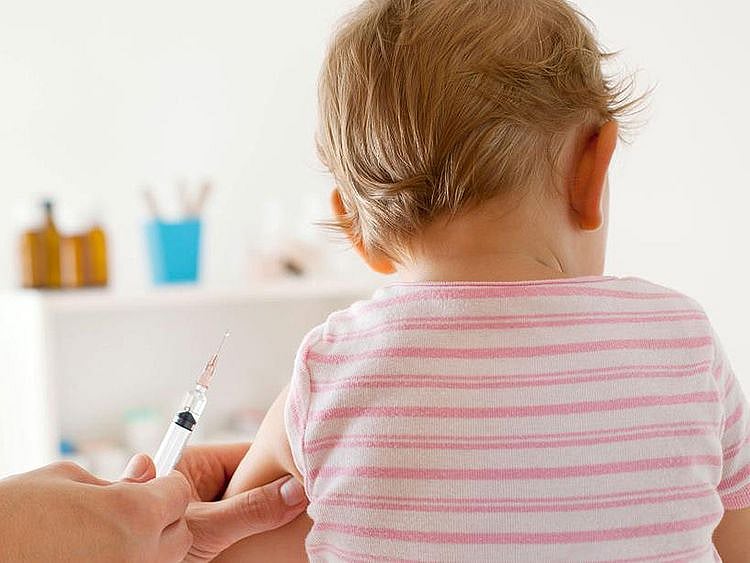7 things to know about vaccinations in the UAE
The array of immunisations your baby needs can be very confusing, here’s our handy guide

Typhoid? BCG? Meningitis, rotavirus, chicken pox? The world of vaccinations can be rather confusing, especially when you’re in that post-birth blur and can’t quite remember what day of the week it is, never mind what you’re supposed to be doing with your baby. Here’s our handy guide to immunisations in the UAE...
1. Where do I start?
Your first experience of vaccinations will likely occur before you’ve even left the hospital; many doctors here administer the BCG jab in the first couple of days following baby’s birth. Once you get home, the best plan of action is to discuss options with your paediatrician, who can give you advice on what vaccinations are currently recommended, standard and optional. You’ll also be able to find out how best to manage vaccination days, discover what to expect from your baby and discuss options for managing any post-vaccination side effects. You can also do some research online, read our guide on childhood vaccinations in Dubai
The Dubai Health Authority's recommended childhood vaccines include BCG (against tuberculosis), diphtheria, tetanus toxoid, pertussis (DTaP), poliovirus vaccine (IPV/OPV), measles, mumps, rubella (MMR), haemophilus influenza type b (Hib) vaccine, hepatitis B vaccine (HBV), varicella, and pneumococcal vaccines.
You may also be interested in: '7 things every parent needs to know about childhood meningitis in the UAE'
2. Which schedule should I follow?
Immunisation schedules are different depending on where you live in the world. This is because in some areas the risk of getting certain infections is higher; for example, the risk of getting TB in the UAE is higher than in many countries in Europe, so it’s recommended for all babies to immunised against TB in the first few days of birth. For expats this can be cause complications in terms of what has been given in one place and what is needed after re-location.
The Dubai Health Authority introduced the first comprehensive immunisation services policy for the Emirate of Dubai in January 2012.
DHA immunization schedule for children between 0-6 years:
At birth: BCG, Hep B. Two months: DTaP, Hib, Hep B, IPV, PCV. Four months: DPT, Hib, Hep B, OPV, PCV. Six months: DPT, Hib, Hep B, OPV, PCV. 12 months: MMR, varicella. 18 months: DTaP, Hib, OPV, PCV. Five to six years: DPT, OPV, MMR, varicella.
3. Will vaccinations be covered by insurance?
Some health insurance providers include cover for vaccinations, either through direct billing or via pay and claim, but many don’t as preventative medicine is often excluded from cover. If yours won’t cough up, you’ll need to budget for your child’s vaccination schedule as it can prove quite costly.
Prices vary between clinics but you can expect to pay anywhere from Dh800 to Dh1,500 for the first set at eight weeks, with subsequent sets more or less depending on the schedule you’re following and the number of vaccinations given at each point on the schedule.
4. Going down the government clinic route
Private clinics aren’t your only option for vaccinations in the UAE, especially if your insurance doesn’t cover preventative medicine and budget is an issue; if you have a valid residency visa, you can visit your local government-run clinic to open a file and you’ll be entitled to free vaccinations for children up to the age of five.
5. The entitlement to free jabs covers all vaccinations on the government schedule, but not any that are considered optional. Here’s what you’ll need to do:
To read more on vaccinations: Your guide to childhood vaccinations in Dubai
6. What do I do if my child has missed any vaccinations, or if we’re late having them done?
Don’t worry. There are plenty of reasons children miss vaccinations – fever, sickness, travel – and your paediatrician will be able to work out a new programme for you so you can catch up.
The DHA has a recommended catch-up vaccination schedule.
7. Are there any nursery or school vaccination programmes I can join?
While nurseries and schools don’t currently run routine vaccination programmes, do keep an eye on communication from your child’s nursery as recently there have been some government-organised vaccination programmes in response to worldwide health advice. You’ll be given the choice of whether to opt in or not, and – if you decide to have the vaccination at nursery/school – be able to choose whether or not you want to be there with your child when they receive the vaccine.
You can find up-to-date information on the UAE’s guidelines for immunisation at dha.gov.ae
Read More:
Sign up for the Daily Briefing
Get the latest news and updates straight to your inbox
Network Links
GN StoreDownload our app
© Al Nisr Publishing LLC 2025. All rights reserved.